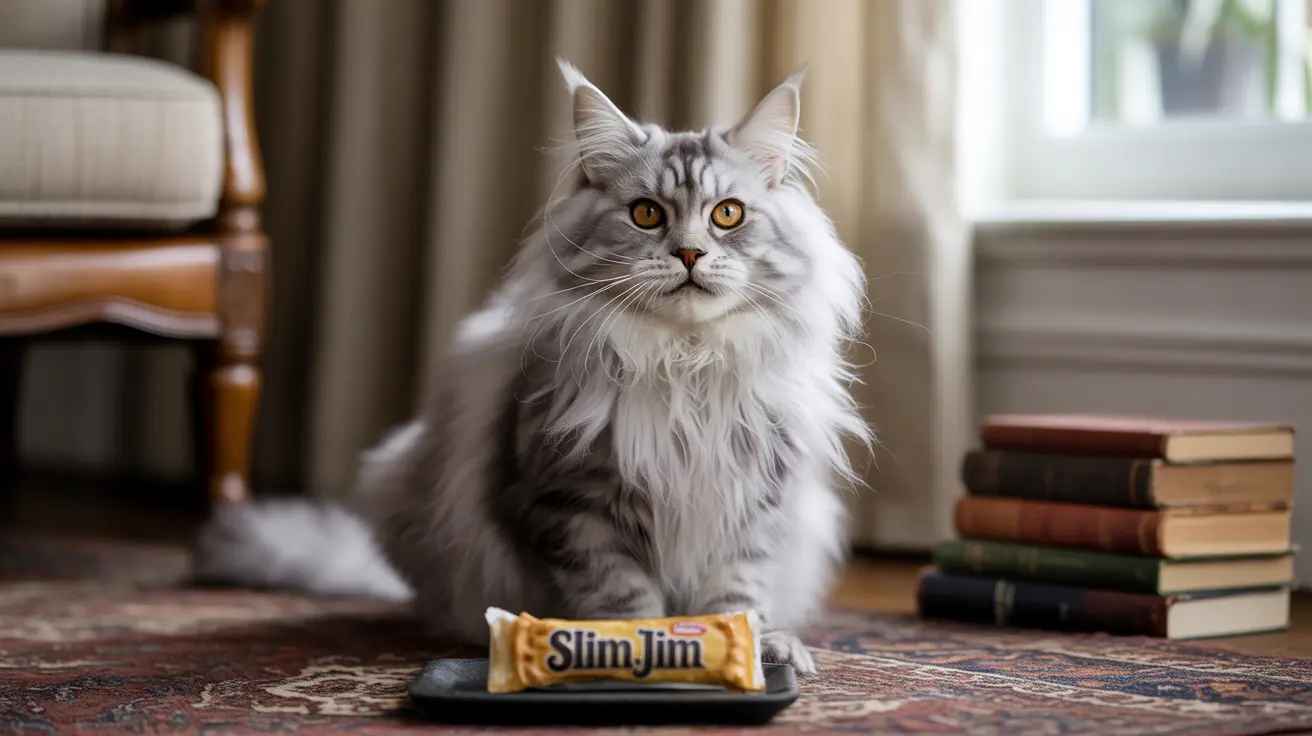Understanding the Risks of Slim Jims for Cats
Slim Jims contain several ingredients that can be problematic for feline health. The high sodium content, preservatives, and artificial additives make these snacks particularly concerning for cats, whose bodies are designed to process raw, natural proteins rather than heavily processed meats.
Dangerous Ingredients and Their Effects
These meat snacks contain several components that can harm your cat's health:
- High sodium levels (210mg per stick) that can stress kidneys
- Artificial preservatives that may cause allergic reactions
- Spices and seasonings, including potentially toxic garlic and onion powder
- Corn syrup and artificial flavors that provide empty calories
- Excessive fat content that could trigger pancreatitis
Impact on Feline Health
Regular consumption of processed meat snacks like Slim Jims can lead to several health issues in cats:
- Obesity from high fat content
- Kidney stress due to excessive sodium
- Digestive problems including vomiting and diarrhea
- Potential allergic reactions to preservatives
- Long-term organ damage from artificial additives
Safe Alternatives to Slim Jims
Instead of Slim Jims, consider these veterinarian-approved treats for your cat:
- Commercial freeze-dried meat treats specifically made for cats
- Single-ingredient protein snacks (like pure chicken or fish)
- Veterinary-approved dental treats
- Small pieces of plain, cooked chicken or fish (unseasoned)
Emergency Response: What to Do If Your Cat Eats a Slim Jim
If your cat manages to sneak a bite of a Slim Jim, don't panic. Monitor them for the following 24 hours and watch for these symptoms:
- Vomiting or diarrhea
- Lethargy or unusual behavior
- Excessive thirst
- Loss of appetite
Contact your veterinarian if any concerning symptoms develop, especially if your cat has consumed a large amount.
Prevention and Best Practices
To protect your cat from potentially harmful snacks:
- Store all human snacks in secure, cat-proof containers
- Educate family members about appropriate cat treats
- Keep a supply of cat-specific treats readily available
- Maintain regular feeding schedules to reduce begging behavior
Frequently Asked Questions
Can cats safely eat Slim Jims as an occasional treat?
No, cats should not eat Slim Jims, even occasionally. The high levels of sodium, preservatives, and artificial additives make them unsuitable and potentially harmful for feline consumption.
What ingredients in Slim Jims make them unhealthy or risky for cats?
The main problematic ingredients include excessive sodium, artificial preservatives, spices (including toxic garlic and onion powders), corn syrup, and high fat content. These components can cause various health issues in cats.
What symptoms should I watch for if my cat eats a Slim Jim?
Monitor your cat for vomiting, diarrhea, excessive thirst, lethargy, and changes in appetite. If these symptoms occur, especially after consuming a large amount, contact your veterinarian.
Are there safer meat treat alternatives to Slim Jims that I can give my cat?
Yes, safer alternatives include cat-specific freeze-dried meat treats, single-ingredient protein snacks, and small pieces of plain, cooked chicken or fish without seasoning.
Why do veterinarians recommend against feeding processed human snacks like Slim Jims to cats?
Veterinarians advise against feeding Slim Jims to cats because they contain ingredients that can harm feline health, including excessive sodium, preservatives, and artificial additives. Cats require species-appropriate nutrition that processed human snacks cannot provide.
Conclusion
While Slim Jims might be a tasty snack for humans, they have no place in your cat's diet. Focus instead on providing species-appropriate treats that support your cat's health and well-being. When in doubt about treat choices, always consult with your veterinarian for safe recommendations tailored to your cat's specific needs.






